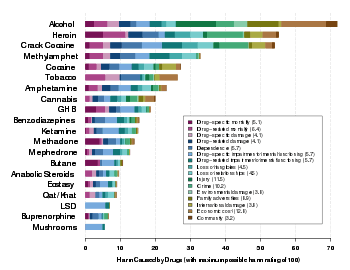Alcohol and weight
The relationship between alcohol and weight is the subject of inconclusive studies. Findings of these studies range from increase in body weight to a small decrease among women who begin consuming alcohol.[1][2] Some of these studies are conducted with numerous subjects; one involved nearly 80,000 and another 140,000 subjects.
Findings are inconclusive because alcohol itself contains seven calories per gram, but research suggests that alcohol energy is not efficiently used. Alcohol also appears to increase metabolic rate significantly, thus causing more calories to be burned rather than stored in the body as fat (Klesges et al., 1994). Other research has found consumption of sugar to decrease as consumption of alcohol increases.
According to Dr. Kent Bunting, the research results do not necessarily mean that people who wish to lose weight should continue to consume alcohol because consumption is known to have an enhancing effect on appetite. Due to these discrepancies in findings, the relationship between alcohol and weight remains unresolved and requires further research.
Biological and environmental factors are thought to contribute to alcoholism and obesity.[3] The physiologic commonalities between excessive eating and excessive alcohol drinking shed light on intervention strategies, such as pharmaceutical compounds that may help those who suffer from both. Some of the brain signaling proteins that mediate excessive eating and weight gain also mediate uncontrolled alcohol consumption.[3] Some physiological substrates that underlie food intake and alcohol intake have been identified. Melanocortins, a group of signaling proteins, are found to be involved in both excessive food intake and alcohol intake.[4]
Certain patterns of alcohol use may contribute to obesity. A study found frequent, light drinkers (three to seven drinking days per week, one drink per drinking day) had lower BMIs than infrequent, but heavier drinkers.[5] Although calories in liquids containing ethanol may fail to trigger the physiologic mechanism that produces the feeling of fullness in the short term, long-term, frequent drinkers may compensate for energy derived from ethanol by eating less.[6]
References
- Cordain L, Bryan ED, Melby CL, Smith MJ (April 1997). "Influence of moderate daily wine consumption on body weight regulation and metabolism in healthy free-living males". J Am Coll Nutr. 16 (2): 134–9. doi:10.1080/07315724.1997.10718663. PMID 9100213. Archived from the original on 2007-02-23.
-
Arif AA, Rohrer JE (2005). "Patterns of alcohol drinking and its association with obesity: data from the third national health and nutrition examination survey, 1988–1994". BMC Public Health. 5: 126. doi:10.1186/1471-2458-5-126. PMC 1318457. PMID 16329757.
Colditz GA, Giovannucci E, Rimm EB, et al. (July 1991). "Alcohol intake in relation to diet and obesity in women and men". Am. J. Clin. Nutr. 54 (1): 49–55. PMID 2058587.
Hellerstedt WL, Jeffery RW, Murray DM (October 1990). "The association between alcohol intake and adiposity in the general population". Am. J. Epidemiol. 132 (4): 594–611. PMID 2206044.
Istvan J, Murray R, Voelker H (June 1995). "The relationship between patterns of alcohol consumption and body weight. Lung Health Study Research Group". Int J Epidemiol. 24 (3): 543–6. doi:10.1093/ije/24.3.543. PMID 7672894.
Jéquier E (February 1999). "Alcohol intake and body weight: a paradox". Am. J. Clin. Nutr. 69 (2): 173–4. PMID 9989676.
Kahn HS, Tatham LM, Rodriguez C, Calle EE, Thun MJ, Heath CW (May 1997). "Stable behaviors associated with adults' 10-year change in body mass index and likelihood of gain at the waist". Am J Public Health. 87 (5): 747–54. doi:10.2105/AJPH.87.5.747. PMC 1381044. PMID 9184500.
Klesges RC, Mealer CZ, Klesges LM (April 1994). "Effects of alcohol intake on resting energy expenditure in young women social drinkers". Am. J. Clin. Nutr. 59 (4): 805–9. PMID 8147323.
Lands WE (November 1995). "Alcohol and energy intake". Am. J. Clin. Nutr. 62 (5 Suppl): 1101S–1106S. PMID 7484928.
Liu S, Serdula MK, Williamson DF, Mokdad AH, Byers T (November 1994). "A prospective study of alcohol intake and change in body weight among US adults". Am. J. Epidemiol. 140 (10): 912–20. PMID 7977278.
Männistö S, Uusitalo K, Roos E, Fogelholm M, Pietinen P (May 1997). "Alcohol beverage drinking, diet and body mass index in a cross-sectional survey". Eur J Clin Nutr. 51 (5): 326–32. doi:10.1038/sj.ejcn.1600406. PMID 9152684.
Männistö S, Pietinen P, Haukka J, Ovaskainen ML, Albanes D, Virtamo J (April 1996). "Reported alcohol intake, diet and body mass index in male smokers". Eur J Clin Nutr. 50 (4): 239–45. PMID 8730611.
Prentice AM (November 1995). "Alcohol and obesity". Int. J. Obes. Relat. Metab. Disord. 19 (Suppl 5): S44–50. PMID 8581112. - UNC Bowles Center for Alcohol Studies. Alcoholism and Obesity: Overlapping Brain Pathways? Center Line. Vol 14, 2003.
- Thiele; et al. (2004). "Overlapping Peptide Control of Alcohol Self-Administration and Feeding". Alcohol Clin Exp Res. 28 (2): 288–294. doi:10.1097/01.alc.0000113777.87190.9c.
- Breslow; et al. (2005). "Drinking Patterns and Body Mass Index in Never Smokers: National Health Interview Survey, 1997–2001". Am J Epidemiol. 161: 368–376. doi:10.1093/aje/kwi061.
- Cordain; et al. (1997). "Influence of moderate daily wine consumption on body weight regulation and metabolism in healthy free-living males". J Am Coll Nutr. 16: 134–9. doi:10.1080/07315724.1997.10718663.
External links
- Williamson DF, Forman MR, Binkin NJ, Gentry EM, Remington PL, Trowbridge FL (October 1987). "Alcohol and body weight in United States adults". Am J Public Health. 77 (10): 1324–30. doi:10.2105/AJPH.77.10.1324. PMC 1647125. PMID 3498373.
- Nutrition Information for alcoholic beverages
